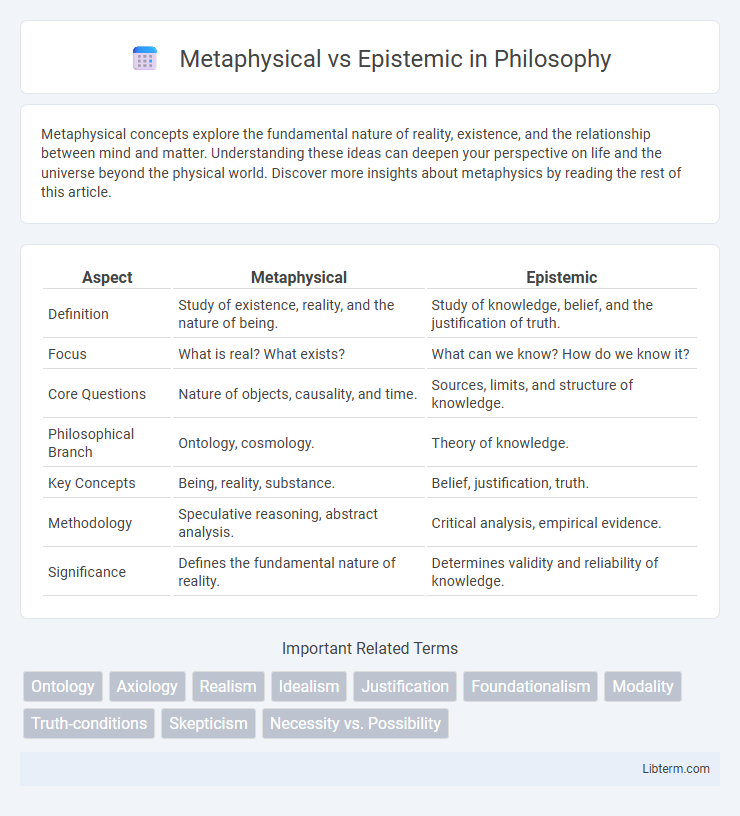Metaphysical concepts explore the fundamental nature of reality, existence, and the relationship between mind and matter. Understanding these ideas can deepen your perspective on life and the universe beyond the physical world. Discover more insights about metaphysics by reading the rest of this article.
Table of Comparison
| Aspect | Metaphysical | Epistemic |
|---|---|---|
| Definition | Study of existence, reality, and the nature of being. | Study of knowledge, belief, and the justification of truth. |
| Focus | What is real? What exists? | What can we know? How do we know it? |
| Core Questions | Nature of objects, causality, and time. | Sources, limits, and structure of knowledge. |
| Philosophical Branch | Ontology, cosmology. | Theory of knowledge. |
| Key Concepts | Being, reality, substance. | Belief, justification, truth. |
| Methodology | Speculative reasoning, abstract analysis. | Critical analysis, empirical evidence. |
| Significance | Defines the fundamental nature of reality. | Determines validity and reliability of knowledge. |
Defining Metaphysical Concepts
Defining metaphysical concepts involves exploring the fundamental nature of reality, existence, and the relationships between entities beyond physical observation. Metaphysics addresses questions such as what it means for something to exist, the nature of objects and their properties, and the structure of time and space. In contrast, epistemic analysis focuses on the nature and scope of knowledge, belief, and justification, emphasizing how we come to know or understand those metaphysical claims.
Understanding Epistemic Foundations
Epistemic foundations center on the nature and scope of knowledge, emphasizing justification, belief, and truth conditions that define how we acquire and validate information. Metaphysical inquiries address the fundamental nature of reality itself, including the existence and properties of entities beyond mere knowledge claims. Understanding epistemic foundations requires analyzing the criteria for knowledge and distinguishing between belief and certainty within the context of human cognition and evidence evaluation.
Key Differences Between Metaphysical and Epistemic
Metaphysical concerns the nature of reality, existence, and the fundamental structure of the world, exploring questions about what entities exist and their properties. Epistemic relates to knowledge, belief, and justification, focusing on how we acquire, validate, and understand information. The key difference lies in metaphysics addressing what is, whereas epistemology investigates how we know what is true.
Historical Perspectives on Metaphysics and Epistemology
Historical perspectives on metaphysics trace back to ancient philosophers like Aristotle, who defined metaphysics as the study of being and existence beyond the physical world. Epistemology evolved through thinkers such as Descartes and Locke, focusing on the nature and limits of human knowledge. The medieval period integrated metaphysical and epistemic concerns, exemplified by Aquinas' synthesis of faith and reason, shaping the trajectory of Western philosophy.
Metaphysical Theories and Examples
Metaphysical theories explore the fundamental nature of reality, addressing concepts such as existence, causality, and the nature of objects beyond empirical observation. Examples include dualism, which posits the separation of mind and body, and monism, asserting that all is one substance. These theories shape our understanding of what is ultimately real versus what is merely knowable.
Epistemic Approaches to Knowledge
Epistemic approaches to knowledge emphasize the processes and justification of belief, focusing on how individuals acquire, validate, and structure their understanding through evidence, reasoning, and experience. These approaches prioritize the criteria that distinguish knowledge from mere opinion, such as coherence, reliability, and truth justification. Epistemic theories include foundationalism, coherentism, and reliabilism, each addressing the nature of justification and the limits of human cognition in acquiring true knowledge.
Intersections: Where Metaphysical and Epistemic Overlap
Metaphysical and epistemic inquiries intersect in exploring the nature of reality and the limits of human knowledge, especially where understanding the existence of entities hinges on how knowledge about them is acquired or validated. This overlap manifests in debates about the ontological status of concepts like truth, belief, and perception, which require assessing both what exists and how we can know or justify that existence. The intersection highlights challenges in distinguishing between what is real independently of human cognition and what is constructed or dependent on epistemic frameworks.
Philosophical Debates: Ontology vs. Epistemology
Metaphysical debates center on ontology, exploring the nature of being, existence, and reality, while epistemic discussions focus on epistemology, concerning the origin, scope, and validity of knowledge. Ontology examines what entities exist and their fundamental categories, whereas epistemology investigates how knowledge is acquired, justified, and differentiated from belief. Philosophical discourse contrasts these domains to understand the relationship between what is real and what can be known.
Practical Implications in Modern Thought
Metaphysical questions about the nature of reality shape philosophical frameworks that influence ethics, politics, and science by defining what entities exist and how they interact. Epistemic considerations, focusing on the nature and limits of knowledge, directly impact methodologies in research, technology development, and education by determining criteria for evidence and belief justification. In modern thought, balancing metaphysical assumptions with epistemic rigor ensures that practical decisions in fields like artificial intelligence, law, and medicine are both ontologically sound and epistemically justified.
Conclusion: Bridging Metaphysical and Epistemic Boundaries
Bridging metaphysical and epistemic boundaries enhances our understanding of reality by integrating the nature of existence with the limits of knowledge. This convergence allows for a more comprehensive framework that acknowledges both what is ontologically real and what can be known or justified. Such synthesis promotes interdisciplinary inquiry, enriching philosophical discourse and practical application in fields like science and ethics.
Metaphysical Infographic

 libterm.com
libterm.com